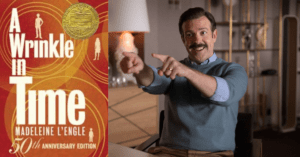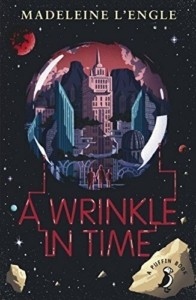Guest Blog Post: What’s A Wrinkle in Time Doing in Ted Lasso?

by Jaime Green
Anyone who’s read and loved A Wrinkle in Time probably thought they knew exactly what was up when the book came on screen. In episode 3 of Ted Lasso, Coach Lasso gives each of his players a gift-wrapped book.
“There are some gifts up in y’all’s lockers.” Like the Mrs Ws, he also gives wisdom in the form of gifts.
Those gifts in Wrinkle used to feel like a bit of narrative trickery to me—the Ws knew what Meg had to do, they knew what she had in her that would help her do it. Why speak in riddles and suggestions? Weirdly, it was watching Ted Lasso that made me realize: the gift was only powerful if the recipient figured out how to use it themselves. The gifts were hardly the power at all, what mattered was the discovery.

the puffin uk edition
Before Meg, Calvin, and Charles Wallace’s first expedition to Camazotz, each of the Mrs Ws gives them a gift. Mrs Who gives evocative quotations to the boys; pragmatically, her glasses to Meg. Mrs Which gives them the gift of a command, to stay together, which will of course be forsaken. Mrs Whatsit, most frustratingly and meaningfully, gives each of the children something they already have: to Calvin, his ability to communicate, to Charles Wallace the resilience of his youth. And to Meg, maybe my most treasured line of the book: “Meg, I give you your faults.”
“My faults!” Meg cries. I’ve always heard it as incredulous. How dare Mrs Whatsit not only make the gift something Meg already has—what kind of gift is that!—but also something so horrid. Her faults! The things that make Meg’s life so hard. The things about herself that she hates—the things that make her hate herself. They will turn out to be what lets her stay out of IT’s power.
That’s what I thought Ted was doing when he gave team captain Roy Kent a copy of A Wrinkle in Time. Roy’s gift, too, is his anger. In a later episode, Roy’s struggles on the field are astutely diagnosed: “It’s your anger. That’s your superpower … But that anger doesn’t come out anymore when you play. But it’s still in there. And I worry about what it’s gonna do to you if you keep it all to yourself.” Roy’s anger is a gift to him on the field, but only if he uses it there.
http://https://www.youtube.com/watch?v=ZNy7BYInc9k
Surprisingly, the gift of Meg’s anger as a model for Roy never comes up on the show. Instead, the book is described as “A lovely novel.”—True—“It’s the story of a young girl’s struggle with the burden of leadership as she journeys through space.” Which… I guess is also true? But I’ve never thought of it that way. When I was eight years old and wrong in so many of the same ways as Meg, what I held onto was the hope that my flaws might also be my gifts and powers—my stubbornness, yes, and bossiness and the way I could never fit in. I never even noticed Meg was a leader. Charles Wallace is really the chosen one, the one with powers, the one the malevolence zeroes in on to try to control. And Meg doesn’t lead in the ways we usually think of as leadership. The Mrs Ws direct the plan, they and Meg’s father direct the tessering leaps of action. What Meg does is accept responsibility.
And that ends up being the moment Roy needed—not to connect with or embrace his anger, but to step into his role as captain of a floundering team. He’s reading a scene near the end of the book, before Meg’s second and final tesser into Camazotz, to his niece: “Mrs Which’s voice was grave. ‘What dodo you unndderrsstanndd?’ ‘That it has to be me. It can’t be anyone else.’” “Fuck!” Roy shouts, and it sounds like acceptance. He knows it has to be him. He didn’t need his anger to be given to him as a gift—a professional soccer player doesn’t need to be told it’s okay to be surly and intense the way a young girl might. It’s almost the inverse: when the book is described to Roy as “The story of a young girl’s struggle,” he scoffs, “Am I supposed to be the little girl?” And Ted answers, “I’d like you to be.”
What if it’s not just anger that is good, stubbornness and strangeness and Meg’s particular faults. What if it’s all of our faults—Roy’s anger and Dani’s naïveté and Rebecca’s longing to be loved. What if all of our faults are our gifts and are what we really need, if we can figure out how to use them? If we can be brave enough to accept them.
In the end, though, Meg’s faults only get her so far. They keep her out of IT’s clutches in their first encounter, but just barely—her faults are a gift but they’re a danger, too; from the start she’s worse at tessering and more susceptible to the Dark Thing than anyone else. We don’t know why but I’ve always felt her surliness is the Dark Thing’s way in. And her faults can’t save Charles Wallace. The only thing that can do that is what she has despite her faults, regardless of her faults, the deeper gift so bedrock-strong that her angst and anger can’t shake it. Love.
Standing in IT’s chamber, having realized that what she has that IT does not (that riddle being another gift she’s given) is love, Meg thinks that if she could love IT she could probably defeat it, “perhaps it would shrivel up and die, for she was sure that IT could not withstand love.” But loving the ambassador of malevolence and evil is the work of a saint, not of beautifully flawed Meg Murry. “But she, in all her weakness and foolishness and baseness and nothingness, was incapable of loving IT.” (I’ve always found that line so hard on Meg, I have to read it as her own persistent self-loathing and not an authorial proclamation.) Meg can’t love IT, but to love Charles Wallace requires no force or effort, it’s in her as easily as she breathes (once she can wrest her breathing from IT’s relentless tempo). And so she does, the hugest, simplest thing.
That’s the gift, after all. Sure, to be reminded that her stubbornness and anger are useful tools against IT and the forces of darkness. But moreso—and this is what so many of us needed to be told when we were reading this book as children, or again as adults today—that our flaws can be our strengths. That maybe Meg doesn’t need to hate herself. That stubbornness and anger and feeling different and wrong may actually be beautiful. They can be given back to us as gifts, all our faults can, if we’ll receive them.

Jaime Green is a freelance writer and editor. She is Associate Editor at Slate’s Future Tense and series editor of The Best American Science and Nature Writing. Her first book, about how we imagine alien life in science and in fiction, will be published by Hanover Square Press in 2023.
She wrote about Aunt Beast in 2018. You can read that essay here.
Twitter: twitter.com/jaimealyse
Newsletter: tinyletter.com/jaimealyse


